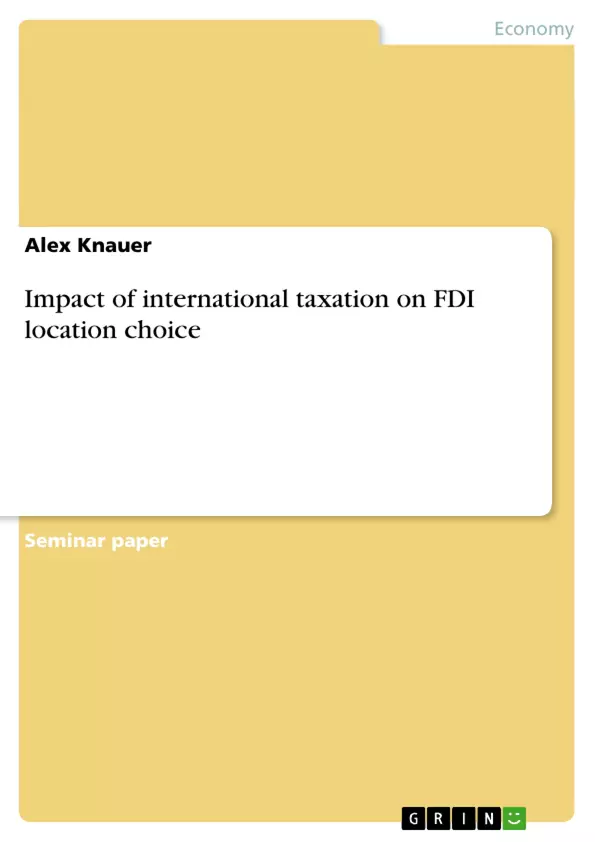Foreign direct investment has often been of great importance for developing countries and countries in transition. These countries develop various strategies to attract FDI, one of which includes the taxation attractiveness. This paper deals with the impact of international taxation on investment location choice of multinational firms. General aspects of taxation of the FDI destination country and the source country are looked close upon. Such general tax factors like corporate income tax rate, indirect taxes and tax law transparency, as well as tax incentives and taxation in the investor’s home country, play an important role for a multinational’s investment location decision, especially for the decision of footloose industries like export-oriented firms or manufacturing companies. Further, bilateral tax treaties including provisions of foreign tax credits, exemptions and tax savings affect the investor’s tax planning, since they may alleviate or completely eliminate the problem of double taxation. Tax avoidance is also an important factor described in the paper. High tax rates, tax incentives and tax treaties may encourage multinational firms to use tax avoidance strategies in order to qualify for tax incentives or extend received ones, or to carry out profit reallocations.
Inhaltsverzeichnis (Table of Contents)
- Abstract
- Contents
- 1. Introduction
- 2. General tax factors affecting FDI
- 2.1. Corporate income tax rate
- 2.2. Indirect taxes
- 2.3. Transparency and complexity of tax systems
- 3. Tax incentives
- 3.1. Objectives of tax incentives towards FDI
- 3.2. Types of tax incentives
- 3.2.1. General tax rate reductions and non-income tax-based incentives
- 3.2.2. Loss carry-forwards
- 3.2.3. Tax holidays
- 3.2.4. Investment allowances and tax credits
- 3.2.5. Free Trade or Export Processing Zones
- 3.2.6. Tax competition and tax havens
- 4. Tax avoidance
- 5. Host country vs. Home country
- 5.1. Taxation of foreign-source income
- 5.2. Tax treaties
- 6. Conclusion
Zielsetzung und Themenschwerpunkte (Objectives and Key Themes)
This paper explores the impact of international taxation on the location choice of foreign direct investment (FDI) undertaken by multinational corporations (MNCs). The paper focuses on FDI flows from developed home countries to developing host countries, aiming to highlight the influence of host country tax factors, tax incentives, home country taxation, and resulting international tax avoidance. The analysis emphasizes the impact of taxation on all types of foreign investors, with a particular focus on highly mobile investors like export-oriented and manufacturing firms.
- Impact of international taxation on FDI location choice
- General tax factors affecting FDI in host countries
- Tax incentives for attracting FDI
- International tax avoidance strategies
- Relationship between host country and home country taxation
Zusammenfassung der Kapitel (Chapter Summaries)
The paper begins with an introduction defining FDI and exploring the role of attracting FDI in economic development activities. The introduction also highlights the key factors influencing MNCs' FDI decisions, including market size, infrastructure, operating costs, and access to resources, leading to the focus on the impact of taxation on these decisions.
Chapter 2 delves into the general tax factors affecting FDI, specifically focusing on the host country's perspective. It explores the impact of the corporate income tax rate on the overall tax burden on a company's activity, considering factors like tax planning and strategies to minimize tax burden. It also discusses the impact of indirect taxes and the transparency and complexity of tax systems on investment decisions.
Chapter 3 examines tax incentives employed by host countries to attract FDI. It discusses the objectives of these incentives and explores various types of tax incentives, including general tax rate reductions, loss carry-forwards, tax holidays, investment allowances, tax credits, Free Trade Zones, and the role of tax competition and tax havens.
Chapter 4 delves into tax avoidance strategies employed by multinational firms. This includes exploring how high tax rates, tax incentives, and tax treaties can encourage firms to engage in tax avoidance to qualify for incentives or extend their benefits.
Chapter 5 focuses on the interplay between host country and home country taxation, examining the taxation of foreign-source income and the role of tax treaties in alleviating double taxation. It discusses how tax treaties can affect a company's tax planning and their potential to completely eliminate double taxation.
Schlüsselwörter (Keywords)
This paper revolves around the key concepts of foreign direct investment (FDI), international taxation, investment location choice, tax incentives, tax avoidance, and the impact of taxation on multinational corporations (MNCs). The paper explores how tax factors, including corporate income tax rates, indirect taxes, tax transparency, tax incentives, and bilateral tax treaties, influence the decision-making process of MNCs regarding FDI.
Frequently Asked Questions about Taxation and FDI
How does international taxation affect FDI location choice?
Multinational firms consider corporate income tax rates, tax incentives, and tax law transparency when deciding where to invest, especially in mobile industries.
What are common types of tax incentives?
Common incentives include tax holidays, investment allowances, tax credits, loss carry-forwards, and Free Trade or Export Processing Zones.
What is the role of bilateral tax treaties?
These treaties help alleviate or eliminate double taxation through provisions like foreign tax credits or exemptions, affecting a firm's tax planning.
How do firms engage in international tax avoidance?
Multinational corporations may use profit reallocations or specific strategies to qualify for or extend tax incentives provided by host countries.
Why is tax transparency important for investors?
Complex and opaque tax systems increase operating risks and costs, often deterring foreign direct investment despite low tax rates.
- Quote paper
- Alex Knauer (Author), 2006, Impact of international taxation on FDI location choice, Munich, GRIN Verlag, https://www.grin.com/document/85714



